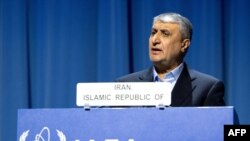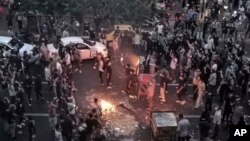
Iran has no "covert objectives" when it comes to its nuclear program and the country is ready to resume its nuclear commitments once Western sanctions are lifted, the head of the country's Atomic Energy Organization told AFP.
"Uranium enrichment is not necessarily for weapons purposes," Mohammad Eslami said on Wednesday in an interview with AFP on the sidelines of the International Atomic Energy Agency's (IAEA) general conference in Vienna.
"We are doing it for research and the production of various isotopes for nuclear industry applications," he said.
Tensions between Iran and the IAEA have repeatedly flared since a 2015 deal curbing Tehran's nuclear program in exchange for sanction relief fell apart.
In recent years, Tehran has decreased its cooperation with the IAEA, while significantly ramping up its nuclear program, including amassing large stockpiles of uranium enriched to 60%, which is close to the 90% needed to develop an atomic bomb.
The rapid expansion of Iran's nuclear program has no "credible civilian justification," according to the U.N. nuclear watchdog.
Amid the impasse, the IAEA's board of governors in June adopted a resolution critical of Iran.
Despite the restrictions on inspections since 2021 and the barring of U.N. inspectors, the IAEA continues to "daily monitor" Iran's nuclear program, at a level that exists "nowhere else in the world," Eslami stressed.
"Our work is completely transparent. It is not as if we were producing a material with covert objectives," Eslami told AFP.
He said Iran was in discussions with IAEA chief Rafael Grossi to organize his visit to the country in the near future, where he is expected to meet President Masoud Pezeshkian.
Since Pezeshkian's election in July, Iran has said it was willing to relaunch talks to revive the Iran nuclear deal it reached with world powers in 2015.
The landmark deal — also known by the acronym JCPOA — started to unravel in 2018 when then U.S. President Donald Trump unilaterally withdrew from it and reimposed sanctions, and Iran retaliated by stepping up its nuclear activities.
Efforts to revive the deal — bringing the United States back on board and Iran back into compliance — have so far been fruitless.
Eslami, however, told AFP that "the JCPOA is not dead."
"As soon as the others resume their obligations, we will act accordingly,” he said, stressing that "it is not possible for them to expect us to keep our commitments" when they themselves have reinstated sanctions.
But Western powers have deplored the "absence" of positive concrete signs from Tehran.
"Patience has its limits, and we will not stand by while Iran continues to obfuscate," the United States, Britain, France and Germany warned in a joint statement last week.
Experts say resumption of talks seems unlikely before the U.S. presidential elections, amid a sharp deterioration in Iran's relations with Europe and the U.S.







